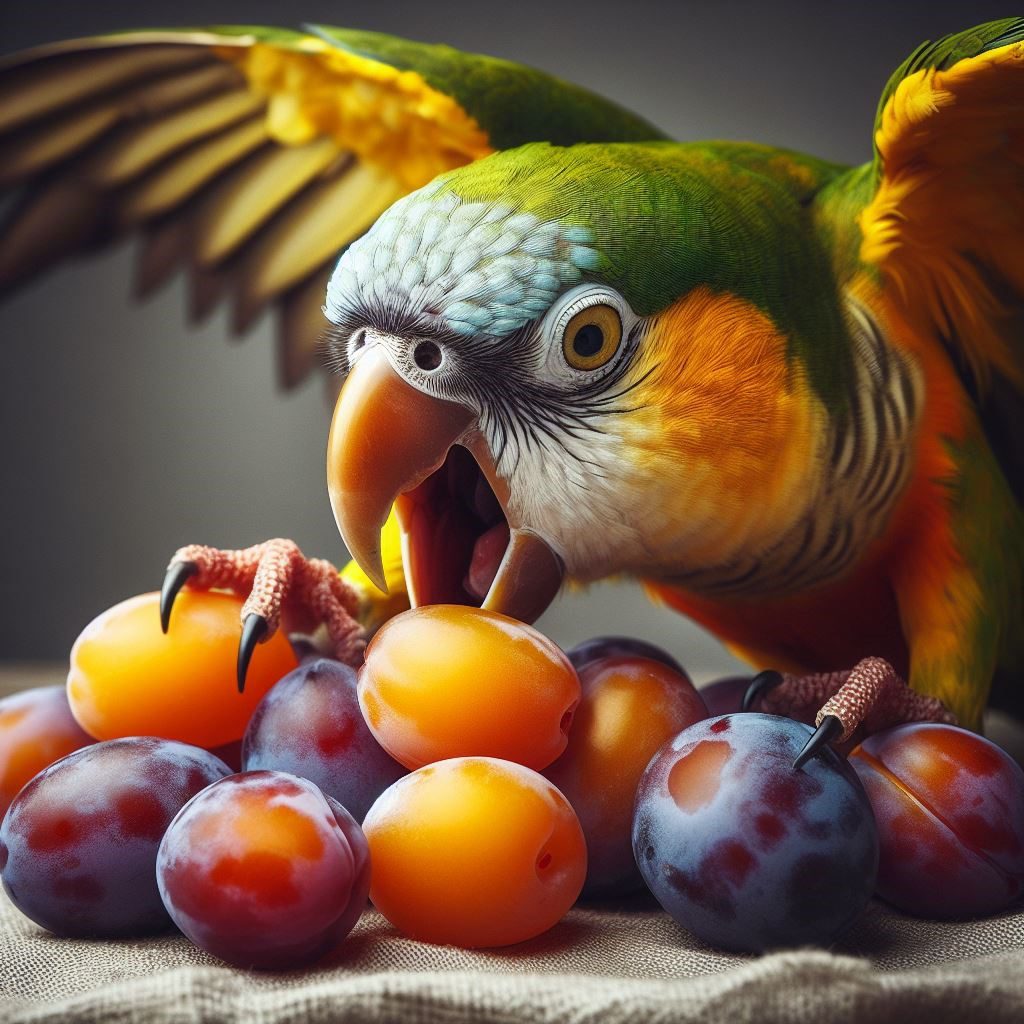Plums are one of my favorite fruits. They are such a reward to eat with their juicy flavor and soft texture. And that’s before we get into the nutritional benefits of them. I was snacking on one the other day and caught my feathered friend staring at me but I’ve never given him plums before so I wasn’t too sure if I was allowed to give him a share.
I felt bad so I researched whether or not he could eat them without it negatively affecting his health. I put my findings together in this article for other curious parrot parents who ran into the same problem as me.

Can parrots eat plums? Yes, parrots can eat plums they are a juicy fruit filled with plenty of nutrients and vitamins like vitamin C, vitamin K, and vitamin A. Along with providing your parrot some calcium, magnesium, phosphorus, potassium, and folate. All of these things combined make plums a fantastic addition that you can introduce into your bird’s diet.
In this article I’m going to explain the benefits of plums, any risks you need to be aware of and other important things so read on!
Plum Benefits For Parrots
We know plums are good for our Parrots, but just how good are they? Let’s take a closer look at the nutritional content.
One cup of sliced plums contains :
| Calories | 76 |
| Protein | 1g |
| Fat | <1g |
| Carbs | 18g |
| Fiber | 2g |
| Sugar | 16g |
Vitamin K
Vitamin K is responsible for healing blood clots, this means if your parrot has enough vitamin K in his diet and they get a cut, the vitamin K will stop the wound from bleeding too badly.
Vitamin A
There’s also vitamin A present in plums. This vitamin plays a big role in your parrot’s eye health, hearing, and sight. Along with keeping its skin and feathers healthy.
A lack of vitamin A in a bird’s diet will result in a weakened immune system, possible respiratory diseases, and poor growth.
Vitamin A deficiency is usually found in parrots on an all-seed diet due to the lack of proper nutrients in these diets. Another reason your parrot may be lacking in vitamin A is not feeding them enough fruit and vegetables of the red, green, and yellow colors as they provide an excellent source of vitamin A.
Parrots who have low levels of vitamin A will show the following symptoms: Sneezing and nasal discharge, tiredness, feather picking, bad odor coming from their breath, and swollen eyes.
Vitamin C
Because parrots use a lot of vitamin C just by existing, it’s critical that they eat foods high in it, such as plums, to avoid problems. Vitamin C helps to strengthen your bird’s immune system, lower blood pressure, reduce inflammation and disease risk, and increase collagen production, all of which contribute to healthier skin.
It also benefits your parrot’s cardiovascular health by removing plaque from the blood vessels and preventing cholesterol from oxidizing.
Calcium
Plums are especially good for African Grey parrots. This is because there’s calcium in plums, something African Grey’s are often found to be deficient in.
Calcium is responsible for over 300 bodily functions in birds so it’s important they get enough of it. Benefits include :
- Helps with blood clotting
- Secretion of hormones
- Fat metabolism
- Helps build and maintain the skeletal structure
Magnesium
Magnesium and calcium work hand in hand. magnesium instructs calcium (among other minerals) to be stored deep in the bones first, rather than getting lost in the soft tissues where they can’t benefit your parrot that much.
Magnesium also plays a vital role in your parrot’s brain, nerves, and digestive so it’s important you feed them food like plums to ensure they get enough of it.
Potassium
Plums also contain a healthy amount of potassium, a mineral important for your parrot’s bone health, controlling its blood pressure and even preventing strokes.
Potassium also plays an important role in controlling and regulating parrots’ heart health.
How You Should Feed Plums To Your Parrot
Before you feed plums to your parrot it’s important to wash them with water first to remove dirt or unwanted substances on the plum, you don’t want your parrot to get sick. Washing plums is as simple as running them under cold water and then drying them off with a paper towel.
Cut in half along the cleft line with a good knife, then gently pull each half apart. Pull out the stone with your knife’s tip, then chop or slice. The skin is edible, but if you want raw plums without the skin, blanch them for 15 seconds in boiling water, then plunge them into cold water to remove them easily.
What Other Foods Can Your Parrot Eat?
You plums know are safe for your Parrot to eat but if you’re like me then you’re always looking for new foods to improve your Parrot diet to create some variety and include vital things that aren’t already in your bird’s diet.
So what other foods can your Parrot eat?
- Fruit & Vegetables
Foods like asparagus, broccoli, carrots, peppers, bananas, blueberries, and pineapples are all fine and encouraged for your Parrot to eat.
- Nuts
Things like almonds, Brazil nuts, cashews, hazelnuts, pistachios, and walnuts can be fed to your parrot. Just be wary of the fat content in some of them so they may need to be treated as a snack for your Parrot. We don’t want them getting fat!
Frequently Asked Questions
Can African Grey’s Eat Plums?
Yes, African Grey parrots can eat plums, in fact as an owner of one it’s encouraged you do. This is because plums contain a healthy dose of calcium, something that African Grey’s have been known to be deficient in.
Are Plums Safe For Parrots?
Yes, plums are completely safe for parrots they contain many vitamins and nutrients that your feathered friend can reap the benefits from. However, like many things in life moderation is key. Fruit and vegetables should only make up around 15-20% of a parrot’s diet.
Plums For Parrots – Final Thoughts
Plums are a great snack for parrots not only do they provide great nutritional value but they are also delicious! Variety in your bird’s diet is important to ensure they get every kind of vitamin and nutrient they deserve. However, like some fruits, plums are high in natural sugars so feed them to your parrot in moderation.
I hope your parrot enjoys their new snack!






